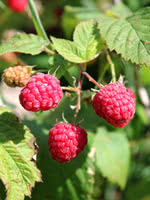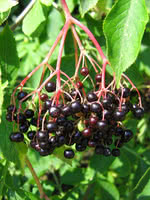Mon-Fri 9am - 5pm Mountain time
Double Delight Raspberry vs Black Elderberry
Rubus x Double Delight
Sambucus canadensis
NOT AVAILABLE THIS SEASON - MIGHT RETURN
NOT AVAILABLE THIS SEASON - MIGHT RETURN
Double Delight raspberries have an excellent sweet-sour flavor. They freeze well and are suitable for use in jams, juices, and pies.
The Double Delight Raspberry is a primocane-fruiting variety, meaning that it produces fruit on first years' growth. Prune stalks down each winter or early spring to get higher fruit yields and easier harvesting.
Black Elderberry is a deciduous shrub native to eastern North America. You can plant this shrub in moist areas and it will help stabilize your soil. You can also use it on rural properties anywhere you'd use a lilac.
Black Elderberries are considered to be partially self-pollinating. So while they will still produce some berries without cross-pollination, planting with another variety will increase yields. Consider planting with Ranch Elderberry or Bob Gordon Elderberry.
Warning: the seeds, stems, leaves, roots, and uncooked berries of the Black Elderberry are poisonous to humans when eaten in quantity. You should cook the berries to make them safe for human consumption.
Double Delight Raspberry Quick Facts
Black Elderberry Quick Facts
Toxicity: leaves, stems, and uncooked berries are poisonous to humans

